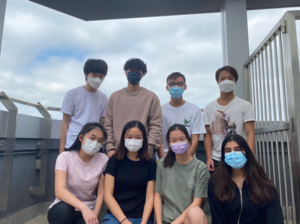
CAS stands for Creativity, Action, and Service, and it is one of three essential elements that every student must complete to receive the IB Diploma. While not formally assessed, CAS provides opportunities for students to enhance their personal and interpersonal development through hands-on learning.
One of the components of CAS is a ‘CAS Project’, a collaborative series of student-initiated CAS experiences over several months engaging students in one or more CAS strands (creativity, activity, and service). Following the five CAS stages of Investigation, Preparation, Demonstration, Action, and Reflection, students can explore their passions whilst challenging themselves to initiate purposeful action around defined goals. The following months will bring a series of interviews where the STC Media Team interviews different students around school to highlight their CAS projects and initiatives.
This week, Hayley Kwan speaks to the STC Media Team about her CAS project Oculus, of which she is the head of External Communications. The Oculus team consists of eight members, divided into five roles: External Communications (Hayley), Internal Communications (Denese), Design (Liam and Penelope), Finance (Daniel and Aaron), and Promotions (Dawnson and Saman). They decided to join Oculus because most of them have aspirations relating to healthcare. As Oculus’s main aim is to raise awareness regarding visual impairment, they see it as highly relevant to their future careers.
Can you introduce STC Oculus? What intentions does your CAS project have?
Oculus focuses on raising awareness regarding visual impairment. We hope that increasing the level of understanding about visual disorders within the STC community will encourage more people to take more action towards the prevention and support for those with visual impairment. We aim to achieve this through various fundraisers, activities and social media content through platforms like Instagram.
What impact/outcome do you hope your project will have on the community?
Our main aim is to raise awareness about the experiences of those living with visual impairment in our communities, including the extent to which visual impairments impact one’s life. Thus, we hope to inspire students to assist with ongoing efforts to help those with debilitating diseases.
Are there any events/initiatives planned to take place?
Earlier in the academic year, our team held a Braille Christmas Card sale where students bought and sent Christmas cards with personalised messages to each other. Each Christmas card design contained a braille strip that said “Merry Christmas” in braille.
Very soon, we will be hosting our annual Blind Concert. Due to the current situation with the pandemic, we have decided to make a video compilation of performers instead of hosting a live concert. The typical way this concert works is that the audience is blindfolded while listening to their peers perform, allowing them to experience having one of their senses removed. Taking inspiration from last year’s team, we have decided to add filters that provide the effect of a specific visual disorder to each performance, allowing the audience to see the world through the eyes of the visually impaired.
We notice that Oculus is an STC organisation created in collaboration with Orbis International. What does Orbis International do? Why is the work they do important?
Since 2015, approximately 253 million people have suffered from various eye conditions worldwide, with 36 million being blind and the remaining 217 million with other moderate to severe visual impairments. The loss of sight affects one’s physical health and influences one’s mental health and overall standard of living. Moreover, employers are reluctant to hire the visually impaired due to the misconception that they are less efficient and cannot perform specific tasks. Thus, those affected report that the struggle of finding a job resulted in reduced levels of independence and confidence.
Orbis is an international non-profit organisation that advocates for global blindness prevention, which they have been working towards for almost 40 years. Orbis acknowledges the impact of visual impairment for individuals, utilising its massive network of hospitals, governments, and universities to help treat rare eye diseases and retrain those who have already lost their sight in hopes they can be employed again. Other projects include their award-winning digital platform ‘Cybersight’, through which experts can share their knowledge with eye care teams around the globe where their physical presence is simply impossible due to cost, logistics and other factors. Furthermore, they have collaborated with the aviation industry since 1982 to create the world’s first ophthalmology aircraft hospital.
What advice would you give to a student hoping to run a service project?
We would advise students to plan every event ahead of time and give each person associated with each task plenty of time to do what they need to do. Students should also form their team carefully and ensure that they are committed to fulfilling their roles and responsibilities to the best of their ability. Moreover, they should maintain a friendly and civil atmosphere to prevent misunderstandings and overly heated disagreements.
Written by: Jada Tam
Edited by: Kadence Wong
